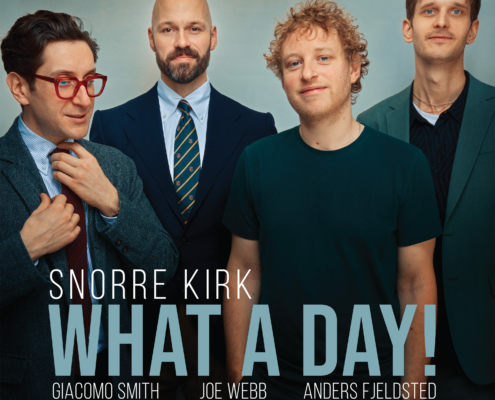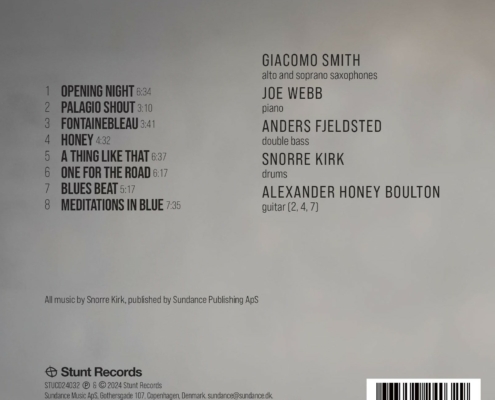Snorre Kirk – What A Day
Immer die Liebe zum ‘frühen’ Jazz. Und eine ansteckende Energie von Swing.
Schlagzeuger Snorre Kirk macht Musik mit unnachahmlichen rhythmisch-musikalischen Puls, der dazu beigetragen hat, den frühen und zeitlosen Sound des Jazz zu schaffen.
Als Snorre Kirk den Klarinettisten und Saxophonisten Giacomo Smith zum ersten Mal in London hörte, gab es für ihn keinen Zweifel. Er wusste sofort, dass er einen Mann getroffen hatte, der auf der gleichen musikalischen Wellenlänge lag.
Dann kam auf Empfehlung von Giacomo der Pianist Joe Webb dazu, und plötzlich war die Bühne frei für eine Wende in Snorre Kirks Arbeit und seiner gefeierten Karriere als Schlagzeuger, Komponist und Bandleader.
„Sie sind witzige und ernsthafte Menschen und unglaublich ansteckend in ihrer Energie. Ich hatte sofort das Gefühl, dass wir alle aus der gleichen musikalischen Welt kommen“, sagt Snorre Kirk. „Wir teilen dieselbe breite Palette von Helden und die Liebe zum frühen Jazz in seinen vielen Formen. Natürlich haben wir alle unsere eigenen kleinen Universen, aber bei uns sind sie sofort und auf natürliche Weise in eine gemeinsame Umlaufbahn geraten. Wir haben eine Menge Gemeinsamkeiten.“
Der Fokus liegt oft darauf, ob etwas ‚alt‘ oder ’neu‘ ist, aber ich sehe darin keine Logik. Je mehr Musik ich höre, unabhängig vom Stil, desto klarer wird mir, dass sie immer von etwas anderem abstammt“, sagt Kirk.
Wenn er die Musik der Band bezeichnen müsste, wäre es Swing. Und wow, sie swingt wirklich(!) – mit diesem unnachahmlichen rhythmisch-musikalischen Puls, der dazu beigetragen hat, den frühen und zeitlosen Sound des Jazz zu schaffen. Andere würden ihn als klassischen Jazz bezeichnen, was nicht gerade das ist, was den Jazz von heute dominiert, und wenn der Begriff auftaucht, werfen sie mit Worten wie Retro um sich. „Unabhängig von den Bezeichnungen kann man Musik entwickeln und sie zu seiner eigenen machen, wenn man ehrlich und mit den richtigen Absichten an sie herangeht“, sagt der 43-jährige Schlagzeuger.
The first meetings took place in 2019. The following year, the coronavirus put the music scene on standby, and it wasn’t until 2023 that the quartet, which included Giacomo Smith, Joe Webb, Danish bassist Anders Fjeldsted, and Snorre Kirk himself, came together and became what would be his current and permanent primary project.
WHAT A DAY! is the first release with the new line-up, and the quartet is complemented on three tracks by Alexander Bouton, who fills the role of rhythm guitarist in the same spirit Freddie Green did with Count Basie’s band.
Like Joe Webb and Giacomo Smith, Alexander Bouton lives in London, where he was a regular at Kansas Smitty’s, a bar and venue with a musical community and a house band of the same name. Giacomo Smith was one of the driving forces there. The pandemic lockdown drove them out of business, but as has been the case throughout history, music finds a way of playing on.
Giacomo Smith has a significant profile on the jazz scene in London. He is active on several fronts, giving him access to the Royal Albert Hall and more humble venues. Joe Webb’s influence should not be understated either. Recognized for his groundbreaking playing, Webb’s approach demonstrates his willingness to renew the jazz piano tradition.
Snorre Kirk was born in Norway but moved to Denmark with his parents at 16. His musical career led him to the Rhythmic Music Conservatory in Copenhagen, where one of his teachers was the late drummer Ed Thigpen. As Snorre Kirk says, he could hardly get any closer to the source of swing.
“As you know, jazz is still a relatively young art form, yet many people are obsessed with freezing music in overly-neatly labeled periods – instead of listening for quality.
The focus is often on whether something is ‘old’ or ‘new,’ but I don’t see the logic in that. The more music I listen to music, regardless of style, the clearer it becomes to me that it always stems from something else,” Kirk explains.
If he had to label the band’s music, it would be swing. And wow, does it ever swing(!) – with that inimitable rhythmic pulse that helped create the early and timeless sound of jazz. Others might call it classic jazz, which isn’t exactly what dominates the jazz of today, and when the term pops up, they start throwing words like retro around. “Regardless of labels, you can develop music and make it your own if you approach it honestly and with the right intentions,” says the 43-year-old drummer.
WHAT A DAY! is Snorre Kirk’s eighth release as a leader. Seven musicians were on the first album, released over a decade ago. The septet became a sextet, then a quintet, and now a quartet – with a single horn player, Giacomo Smith, in front.
“The smaller group allows for much more freedom, which I enjoy. The music with Giacomo and Joe is not radically different from what I’ve previously written, nor is it simply a direct extension of previous work. The overall aesthetic is different, though, with greater historical breadth.”
Ellington and Basie, among others, inspired Snorre’s first recordings. In recent years, he has delved into the group of organ players such as Wild Bill Davies, who, in the 1960s and 1970s, was active in Atlantic City with a unique take on swing.
Musical bridge builder, pianist, and bandleader Earl Hines (1903-1983) also greatly influenced Kirk, who calls him “a key figure who connected traditional jazz to swing jazz to something more modernist.”
Like Snorre Kirk’s previous releases, the music on WHAT A DAY! flows from his original compositions. The feeling of the blues is ever-present on tracks like the low-key One For The Road, inspired by pianist and singer Jay McShann (1916-2006). But Kirk included a compositional twist – instead of the classic twelve-bar form, the song moves in eight-bar periods. In A Thing Like That, listeners get familiar with Kirk’s sense of melody as a composer, and he readily admits to writing melodies as if they were to be sung by a vocalist.
People are listening and like what they hear – Snorre Kirk’s music has palpable appeal. Over the years, his popularity has grown, and he often sells out concerts on European stages. His last album, TOP DOG, was in the top 20 on JazzWeek’s chart of the most-played jazz releases on American radio stations in the Spring and Summer of 2024. It held the number one spot for four weeks – a rare honor for a European jazz musician.
Kirk is far from an overbearing bandleader. He doesn’t hold back as a drummer but doesn’t try to dominate, either. Anyone expecting raucous, predictable drum solos should refrain from holding their breath. He loves that role in a rhythm section – being constantly active and able to add to the whole sound without being too dominant. He’s anything but typical as a modern jazz musician in many ways. “To be honest, the music I like the most isn’t from groups led by a drummer,” Snorre Kirk says with a laugh.
OPENING NIGHT / PALAGIO SHOUT / FONTAINEBLEAU / HONEY / A THING LIKE THAT / ONE FOR THE ROAD / BLUES BEAT / MEDITATIONS IN BLUE.
Giacomo Smith (as, ss), Joe Webb (p), Anders Fjeldsted (b), Snorre Kirk (d).
Guest: Alexander Honey Boulton (g).
LP: STULP 24031, CD: STUCD 24032 Stunt Records, Sundance Music ApS 2024.
STUNT Records
STUCD 24032 663993240329
STULP 24031 663993240312
Vertrieb: Inakusik/ The Orchard
VÖ: 25.10.2024






